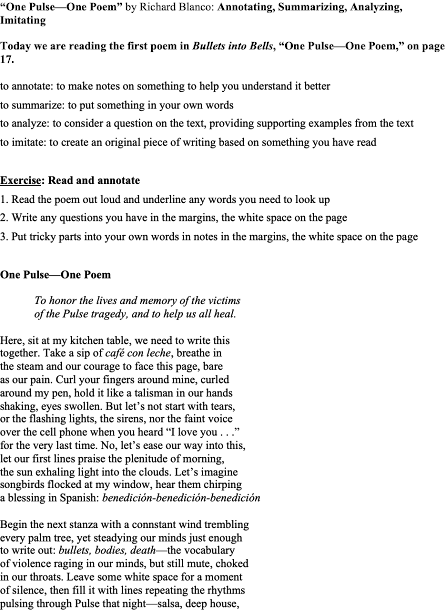Week 73: College Reading and Writing: Roger Reeves and Yvonne Crasso
Week 73: College Reading and Writing: Roger Reeves and Yvonne Crasso
Annotating,
Summarizing, Imitating, Analyzing, Synthesizing
to annotate: to make notes on something to help you understand it
better
to summarize: to put something in your own words
to imitate: to create an original piece of writing based on something
you have read
to analyze: to consider a question on the text, providing supporting
examples from the text
to synthesize: to connect two or more texts in your own writing
We are on page 143 of the book today.
Exercise: Read
and annotate
1. Read the poem and response out loud and underline any words you
need to look up
2. Write any questions you have in the margins or in your notebook
3. Put tricky sentences into your own words in notes in the margins or
in your notebook
Exercise:
Questions for Comprehension of the poem
1. How does the word choice work in this poem?
2. What do you think will “linger inside a suicide” (Reeves 143)?
3. Who is the speaker addressing in this poem?
Exercise:
Questions for Comprehension of the response
1. What has the speaker “learned” (Crasso 144)?
2. Is there a call to action? Who is it aimed at?
Exercise:
Summarize the poem
Write a paragraph summarizing the poem in your own words, with quotations,
in-text citation, and a Work Cited page.
Don’t include your opinion, just summarize the poem.
Example too-short
summary, incorporating quotation and in-text citation:
Roger Reeves’ poem “Maggot Therapy” tells the story of decomposition, a “dress decanted of bones and snow-blown skin” (143). The poem ends with a
request: “teach me to travel light with their bodies in my belly” (Reeves 143).
Work Cited Page
Reeves, Roger. “Maggot Therapy” Bullets
Into Bells: Poets and Citizens Respond to Gun Violence. Ed. Brian Clements
et al. Beacon Press, 2017.
Exercise:
Summarize the response
Write a paragraph summarizing the response in your own words, with
quotations, in-text citation, and a Work Cited Page. Don’t include your opinion, just summarize
the response.
Example summary,
incorporating quotation and in-text citation:
Yvonne Crasso’s response to Roger Reeves’ poem “Maggot Therapy” begins with a memory of Crasso "getting a call from [her] mom” (144). She goes on to
explain that “[t]hrough the years my grief has morphed” (Crasso 144). Crasso finds that even today she’s sometimes “startled” by the fact of her sister’s death, that it’s both "unreal, inconceivable” and "the realest, hardest thing [she’s] ever felt” (Crasso 144).
Work Cited Page
Crasso, Yvonne. “Response to ‘Maggot Therapy” Bullets Into Bells: Poets and Citizens Respond to Gun Violence. Ed.
Brian Clements et al. Beacon Press, 2017.
Exercise:
Synthesizing Analysis
Question for synthesizing analysis: This week is about dealing with
grief. What are some strategies you see here for dealing with grief? Some
people say “time heals all wounds"; do you think the poem and response agree
with this statement? Remember to use
quotations from the poem to make your points, and cite them!
Exercise:
Imitation
Write a therapy poem. Therapy is defined as a treatment intended to
relieve or heal. You can choose something big like a broken heart, fear of
change, disappointment in society. You can choose something small like a tear
in your shirt, a bad haircut, or an itch. Use elements from Reeves’ poem that
you admire to make your own story stronger.
For homework, revise these in a blue book or on loose paper; do not
turn in your notebook or rip out pages to turn in.
1. Summary of Reeves
2. Summary of Crasso
3. Synthesizing Analysis
4. Imitation
About this class:
Your notebooks belong to you; you can write first drafts in them, and
make notes for yourselves. To turn in
homework, revise your work in a blue book or sheets of paper you can get from
your instructor. In this class, you are welcome to submit homework for a grade.
If it’s not strong enough to earn an A, I’ll give you some comments to help you
revise it, and let you do it over again. You have as many chances as you want
to complete and perfect the work in this class, and you are welcome to do more
than one week’s worksheet for homework at a time; ask me for sheets you’ve
missed. Students who complete 15 weeks of graded assignments and a longer paper
can qualify for college credit. When you get close to completing 15 weeks, I’ll
help you get started on your longer paper.


Comments
Post a Comment